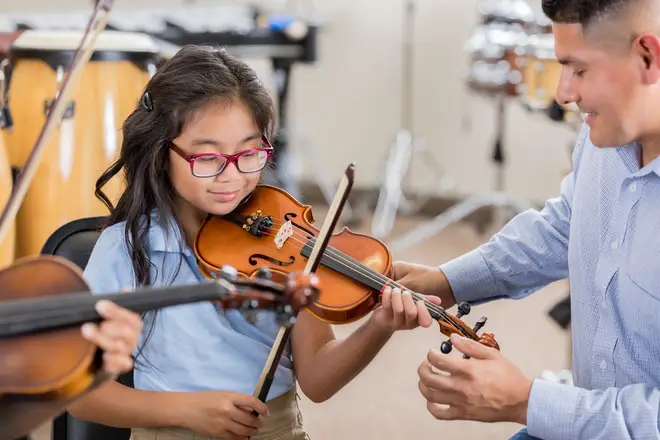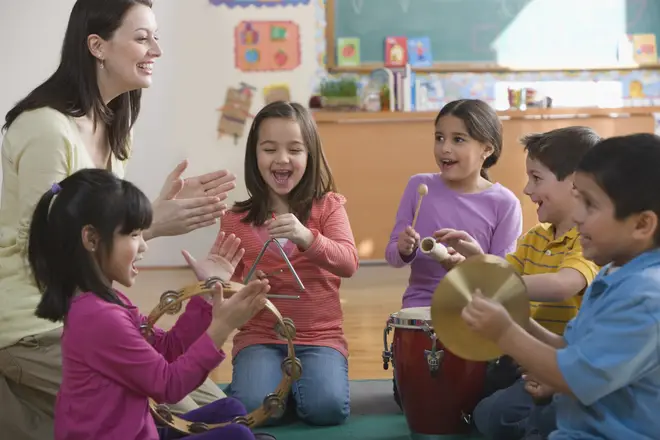Nearly 70 percent of primary schools have reduced music teaching because of COVID-19
7 December 2020, 11:47 | Updated: 7 December 2020, 12:18

Coronavirus is ‘threatening to further erode music education in the UK’, says a stark report on the pandemic’s impact on music in schools.
A report has found music is further disappearing from schools because of the coronavirus pandemic, with singing, hands-on music-making, extracurricular activities and curriculum teaching all deeply impacted.
The heart of the school is missing, published on Friday by the Incorporated Society of Musicians (ISM), has laid bare the devastating impact of COVID-19 on music education, revealing that almost a tenth of UK schools are not teaching class music at all, despite it being obligatory on the curriculum.
Two-thirds (68 percent) of primary schools, and more than a third (39 percent) of secondary schools, have reduced music teaching, according to the report surveying 1,300 teachers.
Singing has been dropped in more than a third (38 percent) of primary schools, and instrumental lessons have been cut completely in almost a quarter (23 percent).
“[Music] has been decimated!” one primary school teacher said. “I now only work with two year-groups for music. I am teaching maths and English interventions for the rest of the time. I’ve lost my studio which is now a staffroom…”
Read more: Nicola Benedetti – ‘Music teaching is vital to a child’s education’ >

Meanwhile, extra-curricular music activities are no longer happening in 72 percent of primary schools and 66 percent of secondary schools this academic year.
Equipment has been cut because of “worries about cleaning it”, with one teacher quoted as saying they have been forced to use 15 B&Q buckets as drums in the classroom.
“Honestly, it’s impossible to state how devastating this will be in the long run for Music as a subject,” a secondary school teacher told the ISM. “There is no provision at all for instrumental lessons, ensemble projects, bigger inclusive performances or even classroom ensemble work. This will, of course, harm students emotionally and academically.”
The report also found music teachers’ health and well-being are being negatively impacted through the sudden changes in the delivery of classroom and extra-curricular music, as well as the reduced support they are receiving from their schools.
The ISM is urging the UK’s four governments to actively encourage music teaching in schools, in line with safety guidance, to provide clear guidance to facilitate music teaching in schools through the current academic year, and to ensure core subjects are not prioritised over creative subjects, creating an “unnecessary hierarchy”.
Read more: The best online music lessons available >

Lang Lang highlights the lack of music education in state schools
The report also highlights music’s role in healing through pandemic times. “Music is central to the recovery curriculum, playing a vital role in schools helping their students to explore and express the varied emotions and challenges that they will have experienced during the pandemic, building stronger relationships and communities within schools and with families.”
Read more: Carol singing and nativity plays will be allowed this Christmas >
In a blog reflecting on the report’s findings, the ISM’s Chief Executive, Deborah Annetts, said: “We are disappointed but not surprised to discover that music education provision is being reduced in our schools as a direct result of the pandemic.
“It is vital that every child can access a quality music education. Therefore there needs to be sustained and meaningful leadership across the governments of all four nations actively encouraging safe music teaching in schools.
“We need to see clear, timely and consistent guidance across all four nations for the rest of the 2020/21 academic year and beyond so that music education is not disrupted further. If we do not do this then not only will less privileged children go without, but the heart of the school will be damaged in the long term.”


































